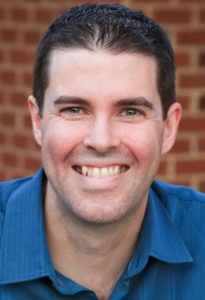My conservative evangelical upbringing taught me all the tenets of “true” Christian faith — the inerrancy of Scripture, that the rapture will happen any day, and that teenage hormones are sinful (even though they are also a gift from God). Another topic I recall that perpetually arose in the churches of my childhood, and on Christian talk-radio in the Houston area, was “the occult.”
We were warned by popular speakers and authors to stay away from rock music, the media, popular television shows and school dances, because they all were under the power of Satan and had demonic influences.

Jonathan Davis
Now, for a movement that has had its “occult antennae” up for some time, evangelical Christianity is doing a poor job of naming or recognizing the cult-like behavior in its midst.
One 600-page tome in my personal library epitomizes this evangelical impulse to name who’s in and who’s out. In The Kingdom of the Occult (Thomas Nelson, 2008), the authors write that many churches have “ventured, in some cases, into the realm of the secret hidden things — the world of the occult.” The following sentences rail against prayer stations, labyrinths and chanting.
Never mind that these practices have been a rich part of Christian worship and practice for millennia. I guess I’ll have to stop taking my kids to that local Christian camp since they’ve embraced the occult, ahem, I mean built a prayer labyrinth.
For all the finger pointing around what practices are a part of “the occult,” many evangelicals seem unable to identify that patterns of behavior now exist in many quarters of American Christendom that closely mirror the behavior of actual cults.
Many have claimed and observed in recent years that the political movement now known as Trumpism exhibits characteristics that serve as identifying markers of a cult. These include:
- A strong authoritarian leader.
- Followers exhibiting unquestioning loyalty to the authoritarian leader.
- The group maintains a strong us-versus-them mentality.
- The group adopts views that run counter to objective fact and scientific scrutiny.
- The lies and alternate reality are repeated so often and so loudly that mental blocks are put up by followers who double down.
- Shame is used to keep people loyal and in line, and dissent is ridiculed.
- The leader is not accountable to anyone.
- Group loyalty divides families and causes adherents to cut off lifelong relationships.
Does all that sound like a cult to you? Does it also sound like Trumpism? To be sure, conservatism and Trumpism are not the same, and even now that the election has passed, it remains to be seen if a cultural vacuum might exist, or if this cultic trend continues.
“I am not the first to think or suggest that Trumpism shows characteristics of a cult.”
I am not the first to think or suggest that Trumpism shows characteristics of a cult. At this point it is hardly an original idea. The number of thought leaders in sociology, counseling, psychcology, religion and politics who have named the cultic elements within Trumpism is remarkable. Conservative publications and liberal ones alike have pointed it out.
A quick Google search for “is Trumpism a cult?” yields nearly 225,000 results. Even people who are world-renowned experts in researching cults have written regarding the cultic tendencies of Trumpism.
Some believe referring to Trumpism as cultic is unhelpful for furthering conversation and understanding, that it’s intellectually dishonest, and even oversimplifies people’s beliefs regarding Trumpism.
Sharday Mosurinjohn, assistant professor of cultural and religious studies at Queens University in Ontario, writes: “But whether literal or figurative, cult discourse hurts critics’ ability to understand Trump’s appeal. The cult diagnosis isn’t a reasoned argument, or even an objective description: it’s moral denunciation.”
I agree only in part. Understanding Trump’s appeal does, in my view, indeed have much to do with understanding a strong inclination on the part of millions to the certainty promised by authoritarian power, among the other impulses listed above. Religious fundamentalism has the same appeal.
Where I agree with Mosurinjohn: It is a definite moral denunciation to label Trumpism as cultic. I own that completely.
“Jesus had no qualms about offering clear moral denunciation of rife hypocrisy and corruption.”
Another thing my evangelical upbringing taught me is that when religious leaders in the Gospels fell prey to idolatry for the sake of political power, Jesus had no qualms about offering clear moral denunciation of rife hypocrisy and corruption. That kind of thing, as it turns out, can get a rabi crucified.
When the power proclaimed is not the power of God to forgive sin and raise the dead, but the power of a political party;
When the messiah sought is not the Good Shepherd or the Prince of Peace, but the one who promises “greatness” at any moral cost;
When the promise of Emmanuel’s coming is not the church’s deepest longing during Advent, but false promises (steeped in baseless claims) regarding overthrowing an election;
Then the church has a real identity crisis.
As Beth Moore recently wrote on Twitter: “We do not place our faith in mortals. We are the church of the living God. We can’t sanctify idolatry by labeling a leader our Cyrus. We need no Cyrus. We have a king. His name is Jesus.”
How long before the cult of political power erodes the faith and witness of evangelicals to the point where clear worship of Christ has ended and a new thing has formed altogether? Evangelical public witness already is a shell of its former self. How much longer until the final breath?
Jonathan Davis is cofounder of the Healthy Churches Institute and founder of the Small-Town Churches Network, helping rural churches thrive in the midst of 21st century change. He provides coaching for individuals and organizations around leadership and vision issues and helps organizations dream about what it means to flourish in the new cultural paradigm.


